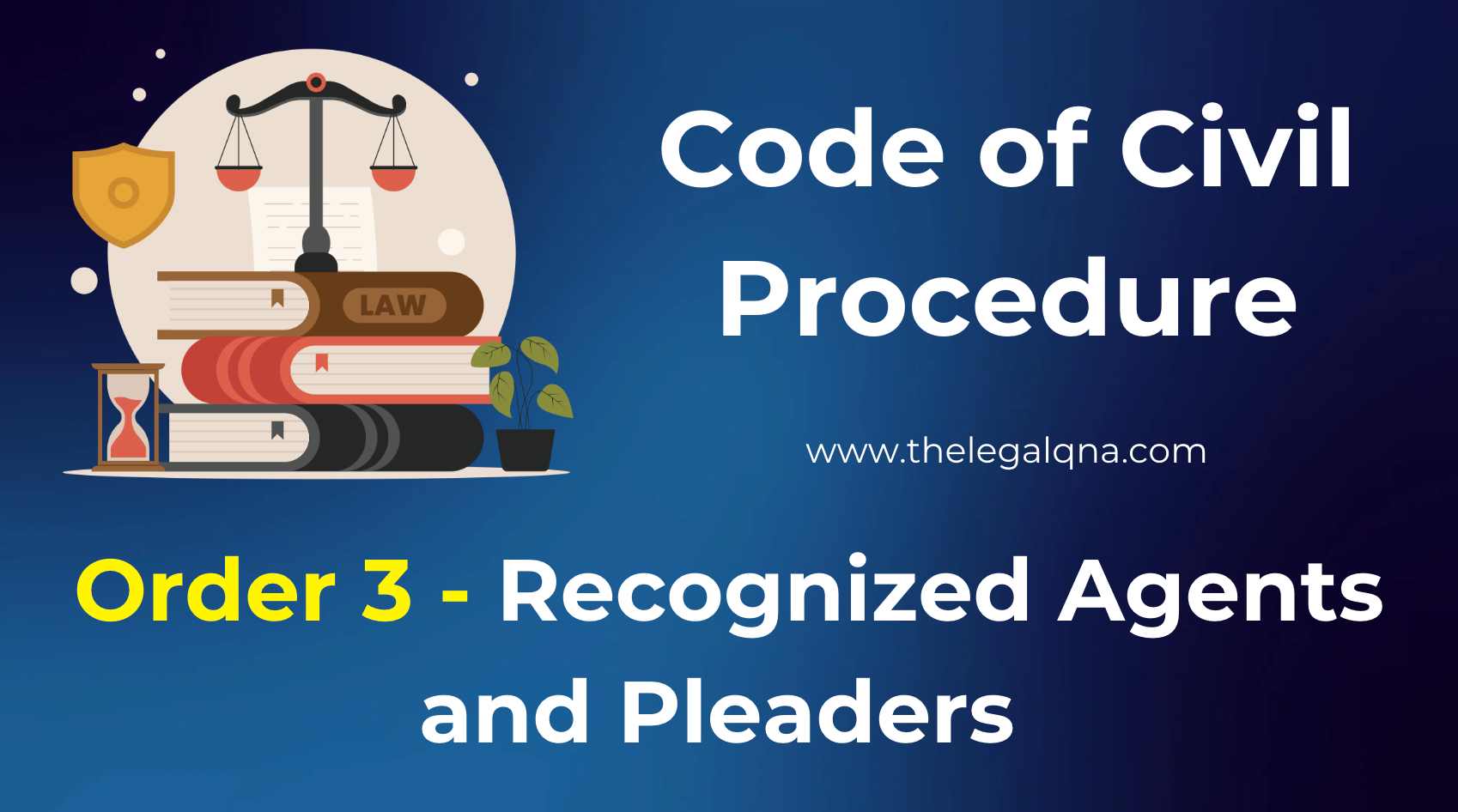Order III of the Code of Civil Procedure (CPC), 1908, allows parties to appear in court through recognized agents (like power of attorney holders) or pleaders (lawyers). It details requirements for appointing agents or pleaders, ensuring proper representation, streamlined service of notices, and adherence to legal procedures.
Key Takeaways:
- Parties can appear in court personally, through recognized agents, or via pleaders.
- Recognized agents include those holding a power of attorney and business representatives for out-of-jurisdiction parties.
- Legal documents served to recognized agents or pleaders are considered legally served to the party they represent.
- Pleaders require a formal written appointment, which needs to be filed in court to act on behalf of a client.
- Parties may also appoint agents specifically to receive court notices, ensuring all parties are reachable for any court communication.
Order III of the Code of Civil Procedure (CPC), 1908, outlines essential rules for representation in court, allowing parties to appear or act through recognized agents or pleaders (lawyers).
These provisions enable flexibility in legal proceedings, permitting parties to be represented by authorized agents, such as those holding power of attorney, or pleaders appointed to act on their behalf.
Order III clarifies the conditions for appointing and recognizing agents or pleaders, ensuring streamlined processes for appearances, applications, and service of legal notices.
Understanding these rules is crucial for effective legal representation and compliance with procedural requirements in court.
1. Appearance in Court: By Person, Recognized Agent, or Pleader
Under Order III, a party involved in a case can appear in court through:
- Personal Appearance: The party can represent themselves directly in court.
- Recognized Agent: An authorized person, such as one holding a power of attorney, can appear on behalf of the party.
- Pleader (Lawyer): The party may appoint a pleader (lawyer) to act on their behalf.
However, the court may direct that the party appear in person if it finds it necessary.
2. Who Can Act as a Recognized Agent?
A recognized agent is someone legally allowed to represent a party in court. The law defines recognized agents as:
- Power of Attorney Holders: Individuals with a legally granted power of attorney can perform actions and make appearances on behalf of a party.
- Business Representatives for Non-Residents: If a party is not residing within the court’s jurisdiction, someone who manages their business locally may act as their agent in matters related to that business. This applies only when no other agent is authorized.
3. Service of Process on Recognized Agents
When legal documents or notices (called “processes”) are served to a recognized agent, it’s considered as effective as serving the documents directly to the party involved. Unless the court decides otherwise, this service on the agent holds the same legal weight as personal service on the party.
4. Appointing a Pleader: Rules and Procedures
For a pleader to represent a party, certain conditions must be met:
- Written Appointment: A pleader can only act for a party if they have been appointed in writing, signed by the party or their authorized agent.
- Filing the Appointment Document: This document, usually a Vakalatnama (authorization to represent), must be filed in court. It remains valid until it is officially ended by either the client or the pleader through a signed document or if the case concludes.
- Duration of Appointment: The appointment remains active throughout various proceedings linked to the case, including appeals, reviews, or applications for corrections in the judgment.
Explanation of Court Proceedings Covered:
- Applications for review of the judgment.
- Applications for correction under Sections 144 and 152 of the CPC.
- Appeals on the court’s decisions.
- Applications for document copies, refunds of court fees, or document returns related to the case.
These steps ensure continuity in representation, covering all necessary proceedings unless otherwise terminated.
5. Limitations on Pleader’s Engagement and Service
Order III emphasizes that:
- Pleader’s Engagement Limits: The court’s authorization to a pleader doesn’t extend beyond what the client has specifically permitted. For example, a pleader representing a party in one court may not automatically be authorized to act in another court unless agreed to by the client.
- Service on Pleader: Any legal notice or document served on the pleader is deemed legally sufficient for the party they represent. This simplifies the process, as the pleader is assumed to communicate all court-related matters to their client.
6. Appointing Agents to Accept Service of Process
In addition to recognized agents, a party can appoint any person within the court’s jurisdiction as an agent to accept service of process. This appointment must:
- Be written, signed by the principal (the person who appoints the agent).
- Be filed in court to be effective.
Note: The court can require a party who doesn’t have a recognized agent within its jurisdiction to appoint one for receiving legal notices and documents.
Verdict
Order III of the Code of Civil Procedure empowers parties to navigate legal proceedings more flexibly by allowing representation through recognized agents or pleaders.
These provisions provide clarity on who can act on behalf of a party, how service of documents on these representatives works, and the formalities required to appoint them.















